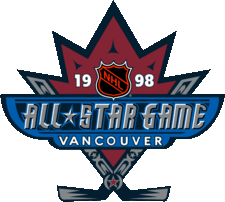48th National Hockey League All-Star Game
 | ||||||||||||||||
| ||||||||||||||||
| Date | January 18, 1998 | |||||||||||||||
|---|---|---|---|---|---|---|---|---|---|---|---|---|---|---|---|---|
| Arena | General Motors Place | |||||||||||||||
| City | Vancouver, British Columbia | |||||||||||||||
| MVP |
| |||||||||||||||
| Attendance | 18,422 | |||||||||||||||
| ||||||||||||||||
The 48th National Hockey League All-Star Game took place at General Motors Place in Vancouver, British Columbia, home to the Vancouver Canucks, on January 18, 1998.
The International Showdown
The 48th game was held in the very same year as the 1998 Winter Olympics in Nagano, providing the NHL to show its players from all over the world. To this extent, the NHL had the all-star teams consist of a team of North Americans playing against a team of stars from the rest of the world.[1] The format change also helped to intensify the game, as national pride would also become a factor. These provisions only applied to the players – coaches were still be selected based on which teams were the best from each conference at the time of the break. This was the last All-Star Game to feature Honorary Captains and Commissioner's Selections system that began in the 1985 and 1991 games respectively.
The Canadian Hockey Association took the all-star weekend as a way of assembling their team as a tuneup for the Olympics by inviting all 23 of its players and immersing them in what they would see at the Olympics. As the 1998 Olympics also featured the first-ever Olympic women's hockey tournament, an exhibition game between the Canadian national women's hockey team and the American national women's hockey team was also scheduled as part of the all-star festivities. 14,000 people watched the game, making it the highest attended women's hockey game in the sport's history to that time.[1]
The weekend also saw its usual share of radical ideas and for various hockey persons to vent out their frustrations: most notably, Bob Clarke used it as a way of trying to convince others not to use the neutral zone trap, a system of defensive play. As the NHL was being outclassed in terms of revenue by other major sports, some such as Bob Gainey also proposed to change the rules so that a game consisted of four 15-minute quarters rather than three 20-minute periods, an idea that proved unpopular.[1] Others vented their frustrations about the poor ice quality found in certain arenas, especially in the South, where the ice could melt easily.
Super Skills Competition
The World All-Stars won the first Super Skills Competition in the new International All-Star format. In the individual events Ray Bourque, Peter Forsberg and Brendan Shanahan would share the victory in the Accuracy Shooting event. Al MacInnis won his second-straight and fourth all-time Hardest Shot event, while Dominik Hasek won his second Goaltenders Competition.
Individual Event winners
- Puck Control Relay –
 Teemu Selanne (Mighty Ducks of Anaheim)
Teemu Selanne (Mighty Ducks of Anaheim) - Fastest Skater –
 Scott Niedermayer (New Jersey Devils) – 13.560 seconds
Scott Niedermayer (New Jersey Devils) – 13.560 seconds - Accuracy Shooting –
 Ray Bourque (Boston Bruins)/
Ray Bourque (Boston Bruins)/ Peter Forsberg (Colorado Avalanche)/
Peter Forsberg (Colorado Avalanche)/ Brendan Shanahan (Detroit Red Wings) – 4 hits, 6 shots
Brendan Shanahan (Detroit Red Wings) – 4 hits, 6 shots - Hardest Shot –
 Al MacInnis (St. Louis Blues) – 100.4 mph
Al MacInnis (St. Louis Blues) – 100.4 mph - Goaltenders Competition -
 Dominik Hasek (Buffalo Sabres) - 3 GA, 16 shots
Dominik Hasek (Buffalo Sabres) - 3 GA, 16 shots
The game
The North America All-Stars overcame a 3–0 deficit to the World All-Stars, setting the stage for the largest comeback victory in All-Star Game history in the first International showdown. Prior to the 1998 Game, no team had come back from a three-goal deficit to win. Mighty Ducks of Anaheim' rightwinger Teemu Selanne recorded a hat trick to become the first European player to be named All-Star M.V.P. Selanne also became the first player from a losing squad to receive the honor since Grant Fuhr accomplished that feat at the 1986 All-Star Game.
Boxscore
- Referee: Paul Stewart
- Linesmen: Mike Cvik, Shane Heyer
- Television: Fox, CBC, SRC